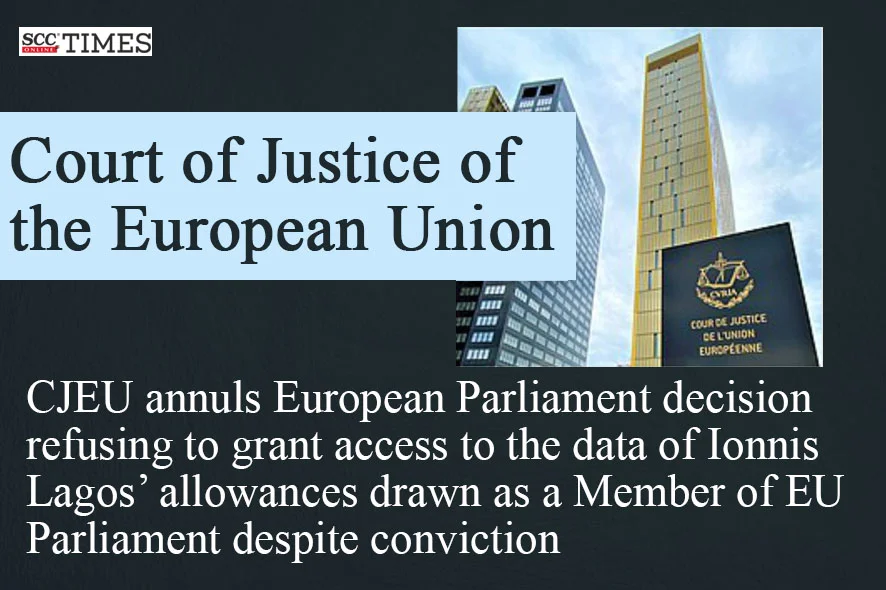Court of Justice of the European Union: The General Court (Fourth Chamber, extended composition), comprising of M. van der Woude, President, R. da Silva Passos (Rapporteur), S. Gervasoni, N. Półtorak and T. Pynnä, Judges, annulled the decision of the European Parliament (“Parliament”) that refused to grant to the applicants the access to the information related to Ionnis Lagos’ (Member of the European Parliament) allowances drawn by him as an office holder, despite having been convicted and sentenced for nearly 14 years for serious crimes. The Court ruled that the applicants were partially successful in establishing the necessity of transfer of information sought by them for the purpose of transparency and verification of the use of public funds.
Background
The applicants based on Article 263 of the Treaty on the Functioning of the European Union, (“TFEU”), sought the annulment of the decision of the Parliament that refused them access to Parliamentary documents containing information relating to the allowances obtained by Ionnis Lagos (Member of the European Parliament from Greece) and his parliamentary assistants. Lagos was sentenced to imprisonment for 13 years and 8 months in 2020 for his membership and leadership of a criminal organisation and a couple of minor offences. Although, even after his conviction, Lagos had not resigned from his mandate, and continued to avail himself of the benefits of being a Member of Parliament thereof.
In 2021, the applicants had submitted to the Parliament requesting access to documents concerning Ionnis Lagos’ allowances, including his travel expenses. The Parliament refused to grant the requested access on basis of the provisions of Regulation 1049/2001, and Regulation 2018/1725 on the protection of natural persons with regard to the processing of personal data by the Union institutions, bodies, offices and agencies, amongst other regulations and former decisions.
The applicants sought the annulment of the Parliament’s decision, and to order the Parliament to pay the costs, whereas the Parliament contended the dismissal of applicants’ action and claimed the former pay the costs.
Court’s Analysis and Ruling
The Court noted that Article 15(3) of the TFEU provides any person residing in the EU a right of access to the documents of the institutions of the EU, subject to limitations; to create a closer union amongst the people of EU, and to mark the democratic nature of these institutions.
The Court also noted Article 9(1) of Regulation 2018/1725, that provides that “personal data are to be transmitted to recipients established in the European Union other than EU institutions and bodies only if the recipient establishes that it is necessary to have the data transmitted for a specific purpose in the public interest and if the controller establishes, where there is any reason to assume that the data subject’s legitimate interests might be prejudiced by that transmission, that it is proportionate to transmit personal data for that specific purpose after having demonstrably weighed the various competing interests.”
Therefore, as previously interpreted by the EU judicature, Article 9(1) mandates the applicant first to demonstrate the necessity of the transmission of personal data for a specific purpose in the public interest. However, the Court also laid emphasis on Article 6(1) of Regulation 1049/2001, that provides that an applicant is not obliged to justify their request of the nature in the instant matter.
The Court noted the applicants’ contention that the purpose of seeking transmission of the documents was to ascertain the actual amount of the sums allocated to Lagos as a Member of Parliament, and the way those funds were used; and to facilitate enhanced public scrutiny and accountability. The applicants had contended that the purpose would serve to build transparency in how the taxpayer’s money was spent, and whether those sums had contributed to facilitate the criminal or unlawful activities of Ionnis Lagos. The Court found the applicants’ purpose to be legitimate.
The Court further analysed whether transmission of data requested was the most appropriate measure of all other possible measures to achieve the purpose stated by the applicants, and also if the measure pleaded was proportionate. Therefore, the Court examined whether the applicants had succeeded in demonstrating the necessity of transmission of personal data, to which end, it found that the applicants had partially succeeded as to various components of the reimbursements, salaries and allowances allotted to Ionnis Lagos. The applicants succeeded in establishing a necessity of transmission of the personal data as to the expenses incurred by Ionnis Lagos’s parliamentary assistants for their travel, irrespective of the fact that they did not hold a public office, because it was difficult to rule out that those expenses did not contribute to the unlawful activities of Lagos. The Court therefore noted that once the necessity of transmission of personal data was established, the institution or body of the European Union in receipt of a request for access to documents containing such data must weigh the various interests of the parties concerned and verify whether there is any reason to assume that the data subjects’ legitimate interests may be prejudiced by that transmission (according to the provisions of Article 8(b) of Regulation 45/2001).
Lastly, the Court concluded and held that the European Parliament was wrong to hold the view that the transmission of personal data would prejudice the legitimate interests of Ionnis Lagos and of his assistants and that such a transmission would not be proportionate.
The Court finally annulled the decision of the Parliament , and as to the matter of costs, that the unsuccessful party was directed to pay the costs,, which in the instant case, was the European Parliament.
[Luisa Izuzquiza v. European Parliament, Case T-375/22, Decided on 08-05-2024]
Advocates who appeared in this case :
Coram: M. van der Woude, President, R. da Silva Passos (Rapporteur), S. Gervasoni, N. Półtorak and T. Pynnä, Judges
Advocates: J. Pobjoy (for the Applicants); N. Lorenz and J-C Puffer (for the Respondents)






